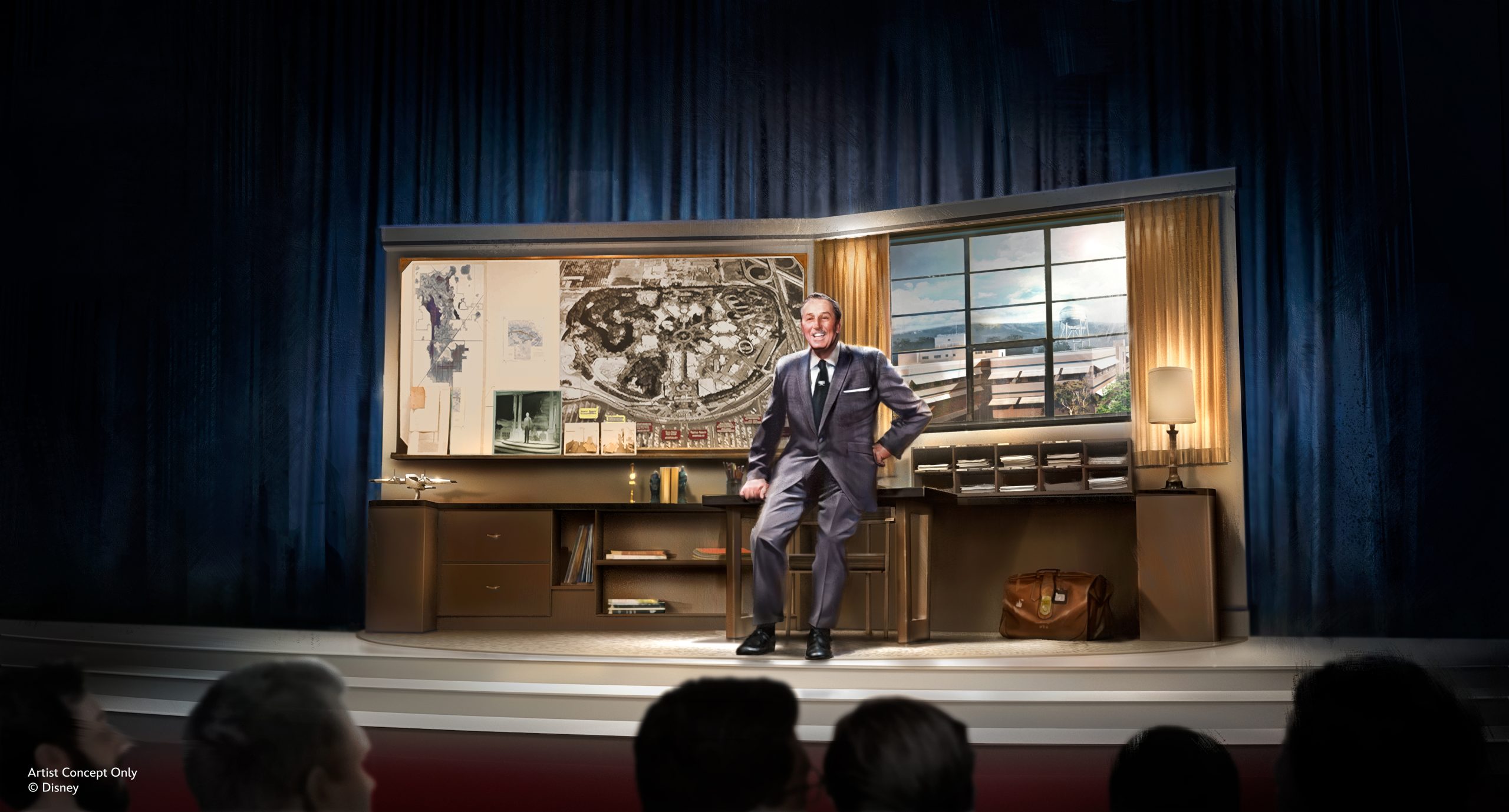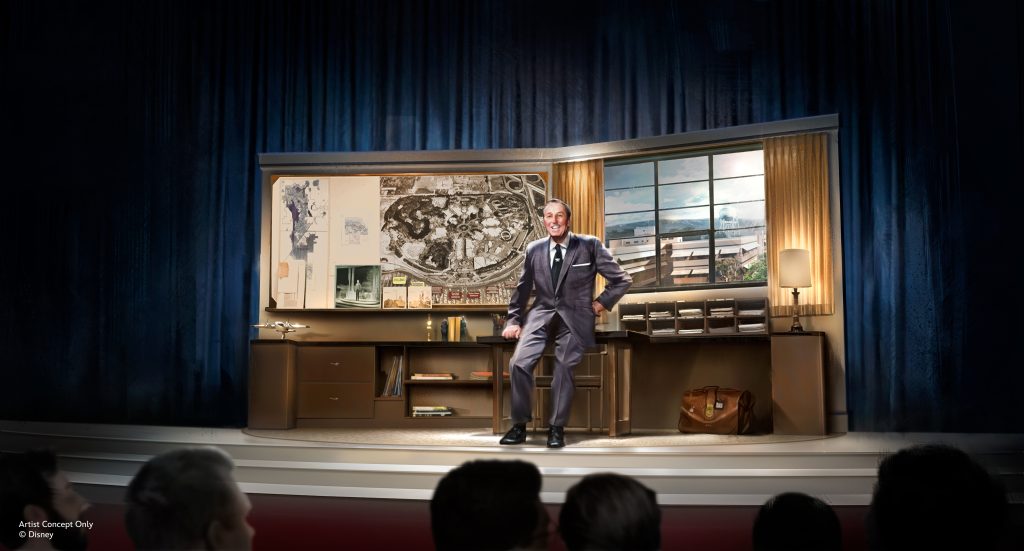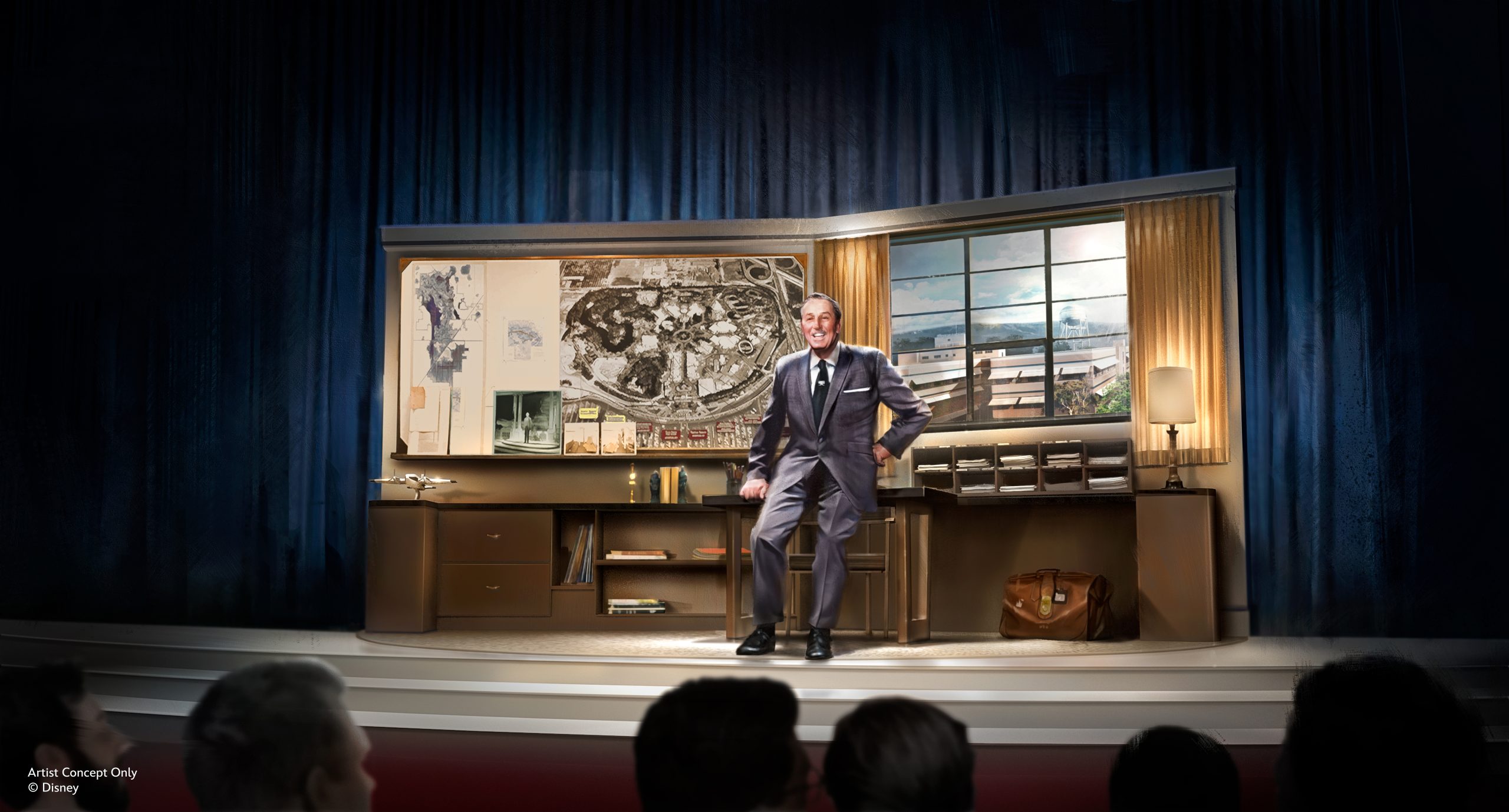
Walt Disney to Be Brought to Life with Audio-Animatronics in 2025: 'Walt Disney – A Magical Life' Revealed
Walt Disney to Be Brought to Life with Audio-Animatronics in 2025: 'Walt Disney – A Magical Life' Revealed

I feel the same way!I was looking at the artwork of the abbreviated set for Lincoln when the show goes rotational. I don’t mind the scenery going minimalist, but I will be disappointed if they can’t work in the finale where the setting sun forms an American flag in the sky. It was moving when I was a kid and still gets me all these years later.
I don't hate it per se, but it just feels bizarre and unnecessary. Why did they feel the need to do this?I adamantly oppose this. Feels gross.
The reason the Trump AA was so ugly was because they built a Hillary figure expecting her to win. Although the replacement animatronic they built for Trump doesn't speak, it's much more faithful to his appearance (other than having far too much hair).I just hope the AA does Walt justice - or it will feel like a wake when the person doesn't look right. Taking political sides out of it, I have to say they did a very poor job on the Trump AA, so hopefully that team is not involved -
View attachment 808174
Perhaps a hologram would be safer...
When Disneyland opened on July 17th, 1955, Walt Disney delivered a heartfelt dedication: “Here age relives fond memories of the past, and here youth may savor the challenge and promise of the future.”
Seven decades later, Walt’s spirit still fills the park. And in 2025, guests will be able to see, hear, and experience Walt Disney like never before.
A new show is coming to the Main Street Opera House: Walt Disney – A Magical Life, announced Disney Experiences Chairman Josh D’Amaro at D23: The Ultimate Disney Fan Event Presented by Visa ® on Saturday. It will feature for the first time an Audio-Animatronics figure of Walt, advancing a technology he pioneered 60 years ago with Abraham Lincoln at the 1964 New York World’s Fair.
“Creating our first Walt figure is an idea that’s been whispered in the hallowed halls of Imagineering for years – decades, even,” said D’Amaro at Horizons: Disney Experiences Showcase. “We just had to wait for innovation to catch up with our dreams. And we’re finally ready.”
The Opera House theater will transform into Walt’s studio office and will bring together the past, present and future of Disney storytelling. A Magical Life will play in rotation with Great Moments with Mr. Lincoln.

Tom Fitzgerald — Senior Creative Executive, Walt Disney Imagineering — said that “so much of Walt’s philosophy is timeless, and as valid today as it was in his lifetime.”
“We wanted the show and story to appeal to all ages, and while some of our younger audience may not know as much about Walt Disney, we felt his story could be inspirational to them,” Fitzgerald said. “Follow your dreams, turn setbacks into success, never give up, and give the world your very best.”
Bringing the new show to life is no easy task, however. Walt Disney is not just an iconic and beloved figure to The Walt Disney Company, but also to pop culture and millions of fans around the world.
Fitzgerald noted that Disney Imagineers took great care when it came to crafting an Audio-Animatronics figure that could capture Walt’s essence.
“We’ve created so many Audio-Animatronics figures over the years from pirates to presidents, but to create a figure of Walt Disney is an honor and a challenge,” he said. “How can we create a lifelike impression of Walt Disney, with the nuances that made him unique in person. The twinkle in the eye, his expressive face — those eyebrows — and the way he used his hands to punctuate his thoughts and ideas?”
Fitzgerald added that the Imagineers “worked closely with the Walt Disney Archives to ensure we had the details as accurate as possible.”
“We scoured through his speeches and documents to find the words that would bring him to life in a way that would feel as if we dropped into his office for a chat,” he said. “Our hope is that the end result will give guests the best sense of Walt and his engaging and warm personality.”
Brian Orr — Show Systems Studio Executive, Walt Disney Imagineering, who is responsible for Audio-Animatronics design and production for all Disney parks and experiences — added that “fans of Walt Disney, in some form or fashion, have the idea of Walt iconically in their head.”
“Our job is to make sure Walt feels believable and connects with the audience, as he’s done with so many people across the world,” he said.
Designing a Walt Disney Audio-Animatronics figure simultaneously highlights to the company’s heritage and its innovative future. Audio-Animatronics “are not only quintessential Disney technology, but also core to our Disney DNA,” Orr said.
“As Walt said, ‘we keep moving forward,’ and this show is a clear illustration of that,” Fitzgerald added. “The Audio-Animatronics figure of Walt will incorporate features and innovations that have never been achieved before. It will be the most lifelike human figure we have ever created. This project has been a labor of love for the team of Imagineers — one which we hope Walt would be proud of.”

 thewaltdisneycompany.com
thewaltdisneycompany.com
They've talked a lot about the figure itself, and it'll probably be very impressive in terms of its fluidity and range of expressions (considering how expressive Walt's face was), but I have to wonder about the voice. Will they use 100% archival recordings, get a voice actor, or generate new dialogue with AI? I'd imagine it would have to be only one of those options, as there'd be a clash if they were mixed together.
I could see them using archival recordings, but could also see them using the same AI tech they use for James Earl Jones' voice for new Vader dialog. Won't have to wait long to see, so we'll soon find out.They've talked a lot about the figure itself, and it'll probably be very impressive in terms of its fluidity and range of expressions (considering how expressive Walt's face was), but I have to wonder about the voice. Will they use 100% archival recordings, get a voice actor, or generate new dialogue with AI? I'd imagine it would have to be only one of those options, as there'd be a clash if they were mixed together.
Inside a boxy, heavily secured warehouse building in Glendale, California, behind an unassuming black curtain, Walt Disney is being brought back to life.
A life-size model of Disney, who died in 1966, is wearing one of the man’s favorite ties and a pair of his old shoes. The model is leaning on a desk, in a replica of his old office, where the entertainment industry pioneer created iconic animations and dreamed up theme parks like Disneyland. A special light is pointed at the model’s face to draw out a twinkle in Disney’s eye.
“This has been a labor of love,” Tom Fitzgerald, a senior creative executive at Walt Disney Imagineering, said as he showed the prototype to Fortune on a recent tour. Fitzgerald’s team is using audio-animatronic technology to create a moving, speaking version of Disney, one that will stand up from the desk and tell a story. New technical methods are being employed to animate the hands and fingers. Other new techniques are being implemented to make the skin look maximally lifelike, because cameraphone-wielding guests will zoom in close to the model’s face. “It’s a new world for us, new challenges,” Fitzgerald commented. “But as Walt would say, it’s kind of fun to do the impossible.”
That’s a handy assessment of the Disney Experiences division writ large. The division is responsible, broadly speaking, for the company’s non-media businesses. Disney operates 12 theme parks in six locations on three continents, five cruise ships in the water, four more ships in development, dozens of hotels, and more attractions than even the most avid fan can count. Together, Experiences accounted for $32.5 billion in revenue last year—about 37% of the parent company’s total sales.
And Disney is counting on the experiences—especially the resorts—to keep growing. On Saturday, during Disney’s biennial D23 fan festival, down I-5 from Glendale in Anaheim, experiences chairman Josh D’Amaro announced big expansions at Disneyland (where the recreation of Walt will be installed next year); Walt Disney World in Orlando; and at parks in Paris, Shanghai, and Hong Kong. In all, D’Amaro is spearheading $60 billion worth of investments into parks and cruises over the next 10 years; it is, as he told Fortune, a “very, very ambitious growth plan.”
That money must be spent wisely, because in recent years the parks division has accounted for the bulk of Disney’s overall profits, offsetting the company’s incredibly costly bets on streaming services like Disney+ and Hulu. Hollywood analyst Matthew Belloni, of Puck News, observed last week that “the other media companies, even Netflix, would kill for this kind of an ATM.” But price hikes at the parks carry consequences. Economic downturns can dramatically affect the division’s bottom line. To wit, when Disney reported quarterly earnings on Aug. 6, it said that attendance was flat at Disney’s domestic properties in the most recent quarter. While overall experiences revenues were still up 2% year-over-year, the company warned about a “moderation of consumer demand” for the parks that “exceeded our previous expectations.”
The parks are still astonishingly profitable, but the red flags emphasize the challenge for D’Amaro, who has worked for the experiences division in various roles for 26 years. With Disney CEO Bob Iger intending to step down in 2026, D’Amaro is one of four potential successors. Everything he says and does is scrutinized by insiders with the CEO search in mind. Meantime, he has to oversee a global workforce of 180,000 and their interactions with millions of sweaty, persnickety tourists. Every attraction at every resort is supposed to work magically for every guest every day—an impossibility to be sure. But it sure is fun to try. As D’Amaro told me, “We always have some magic in our back pocket.”
Turning entertainment IP into emotional connections
The first time I met D’Amaro, for breakfast at Jams, inside 1 Hotel Central Park in New York, he told me a story about Disney’s literal roots. Some Disney fans are so dedicated, so obsessed with every detail in the parks, that even a decision about cutting down a tree could involve the chairman. When Disneyland managers were preparing to open the Star Wars: Galaxy’s Edge attraction in 2019, one particular tree in the park was creating a pinch point, restricting pedestrian flow, so D’Amaro was called in to survey the scene. He asked: “What’s the history of this tree? Was it here when Walt was here?” He had to assess how guests might react. Ultimately the tree was relocated a few feet away.
“You can replace ‘tree’ for trash can or paint color,” D’Amaro said. “One of the things that’s really special about our brand is that people care, and they pay attention to details. They care about our history and they care about our future.”
D’Amaro’s reputation for walking the parks and learning from guests came through as we picked at bowls of fruit. He leaned in as he asked about my spring break trip to Orlando this year, when I took my kids to Walt Disney World for the first time. I told him the visit changed the way I thought about Disney as a media company; I realized that the roller coasters and the Elsa sightings and the Mickey Mouse hugs are Disney’s biggest competitive advantage over other streamers and film studios. It’s one thing to watch Toy Story; it’s another thing to walk through Toy Story Land, greet the characters, and buy the souvenirs. The difference is emotional in nature. “I want our guests to feel something, to connect with something,” D’Amaro said.
This goal is literally written on the walls at the Imagineering offices in Glendale, 20 minutes north of downtown Los Angeles. During a tour of the R&D laboratory, I noticed a whiteboard in one executive’s office with a big question written across the board: “What drives emotional reactions to characters?”
When Disney gets the answer right, it results in deeper, more lucrative relationships with millions of customers. In the R&D space, where the free sodas and open floor plans call to mind Alphabet or Meta, engineers test robotic characters like the BD-X Droids, two-legged droids from the Star Wars universe that can interact with guests. The characters were play-tested at Disneyland for eight weeks earlier this year because, as my tour guide said, “this can’t just work in the lab, it has to work in the park.”
Arriving on campus, I was greeted by Imagineering’s president and chief creative officer, Bruce Vaughn, who rejoined the company last year after a seven-year stint at a virtual reality firm. As Vaughn settled back in, he was struck by the performance of Disney’s international parks. “The growth in Paris is astounding,” he said, describing Disneyland Paris and the newly renamed Disney Adventure World. Tokyo DisneySea’s recent $2.1 billion expansion, called Fantasy Springs, is “a tour de force of what Imagineering can do,” Vaughn said, with areas like Peter Pan’s Neverland and Rapunzel’s Forest that aren’t replicated in the U.S. In China, for instance, the 2016 film Zootopia was such a big hit that D’Amaro’s team decided to build a Zootopia-themed land at Shanghai Disneyland. “We knew it would create demand,” D’Amaro said, and sure enough, “engagement scores are through the roof” since it opened late last year.
“We’re fortunate in that we have a large array of properties and stories to choose from,” D’Amaro added.
Unveiling attractions at D23
The company also has throngs of faithful mouse-eared fans who want to pay homage to all things Disney. D23, the company’s version of Comic-Con, gets its name from 1923, the year Walt Disney opened his first studio. It is a three-day promotional extravaganza, and D’Amaro had a prime spot on stage on Saturday. He promised at least a dozen new reasons to visit the U.S. parks: A forthcoming Avatar land and a Coco-themed ride in Anaheim; a doubling of the size of Avengers Campus at Disney California Adventure, with two new thrill attractions; expansions based on the Indiana Jones movies (at the Animal Kingdom) and Monsters, Inc. (at Hollywood Studios) in Florida; and two big additions to the Magic Kingdom—a land inspired by Disney’s cinematic villains and another land based on the Carsfranchise.
Part of the point of D23, by previewing attractions that are still years away in some cases, is to show fans (and investors) “that we’re going to continue to invest in these incredible experiences across the globe,” as D’Amaro put it.
During the presentation, D’Amaro was joined on stage by boldface Disney names like Kevin Feige, the president of Marvel Studios. D’Amaro also promoted Disney’s collaboration with Epic Games, which will eventually entail a Disney universe within Fortnite. Their presence effectively made D’Amaro’s sales pitch a three-parter: Disney is on land, on sea and online. In the long term, digital interactions with Disney characters could create many new lines of revenue. Imagine what a virtual theme park might feel like inside an Apple Vision Pro or Meta Quest VR headset.
But for now Disney Experiences is very much a physical business. Launching, say, a new Lion King land (coming soon to Disneyland Paris) requires the cooperation of Disney’s studio division but arguably involves much higher stakes than greenlighting a new movie at the studio, by virtue of the fact that Disney has to move mountains (and uproot trees) along the way. In success, a new attraction might remain in the ground for 50-plus years. Youngsters will ride It’s A Small World, grow up, and take their own kids to the same attraction a few decades later. There will be tweaks along the way—witness the recent reimagining of Splash Mountain, a ride that reflected racial stereotypes, as Tiana’s Bayou Adventure. But attractions “should have qualities that will connect people in an emotional way,” D’Amaro said, “and in a way that only Disney can do.”
Serving Disney’s super-fans
WHEN we spoke in advance of D23, D’Amaro was in his office on Disney’s studio lot in Burbank, with a sketch of Cinderella’s castle on one wall and five black-and-white photos of Walt Disney on the other. “I look past my computer to those photographs every day,” he said, “to remember the responsibility that I have.”
D’Amaro’s enthusiasm helps explain why he sometimes gets mobbed by super-fans during visits to the parks. He has a predictable answer about the succession speculation, simply saying that he is focused on the (massive) current job in front of him rather than on whether he might succeed Iger. In addition to all the park enhancements, Disney on Saturday announced that it is adding another four cruise ships to its fleet, in addition to the nine already at sea or announced, for a total of 13. “On our ships,” he said, “we’re able to put all of this intellectual property on display and literally take it around the world.” (When I mentioned to Vaughn that I haven’t been on a Disney cruise, he put on an impressive sales pitch, calling it a “full embrace of the Disney bubble” and “by far the best multigenerational experience.”)
Saturday’s announcements evince that Disney takes a long-term view of its investments, partly out of necessity, since some of the new ships and rides won’t be ready for five-plus years. While the recent earnings results mean that the parks will be under enhanced Wall Street scrutiny, D’Amaro’s lieutenants have many levers to pull to “optimize” attendance, so to speak, and manage the business.
To that end, D’Amaro said, Disney goes to great lengths to provide different price points for guests, so that families can choose between so-called “value” hotels and luxury ones, for instance, or can save money by visiting theme parks at off-peak times of year. Still, there will always be griping about churro prices (Google it) and the general sense that Disney is exploiting visitors. Tourist message boards about Disney are chock full of threads about two-hour waits for rides, and the very expensive and ultimately discontinued Galactic Starcruiser immersive hotel attraction drew a particularly irate fan backlash.
One response to customers’ concerns about value-for-money is to continue adding new attractions every season, like the animatronic Walt that I previewed, with every hair individually placed onto the model’s head.
“This is a big deal for us,” D’Amaro said, explaining that it is pegged to next year’s 70th anniversary of the original Disneyland resort, the only park that Walt Disney himself ever set foot in. Through archived audio recordings, the late Disney will tell his own life story in his own words. Imagineers “are best in class at bringing figures to life in a way that connects emotionally,” D’Amaro said. Walt would appreciate the team’s quest to keep guests coming back for more.

This article confirms that even at D’Amaro's level that he is more involved in even the smallest details that many think are just pawned off to a lowly "cubicle drone" as some like to call them.Here's a new article from Fortune, where the journalist went to view the Walt Audio-Animatronic in Glendale:

Inside Disney's $60 billion plan for theme parks and cruise upgrades | Fortune
Josh D'Amaro leads the company's ultra-profitable 'experiences' division.fortune.com
At a presentation with Kevin Rafferty - he mentioned trying to compete for Bob I. & Bob C.’s attention when both Galaxies Edge and Mickeys Runaway were being developed. Kevin wasn’t presenting to Bob Weiss, it was the top Bob’s!This article confirms that even at D’Amaro's level that he is more involved in even the smallest details that many think are just pawned off to a lowly "cubicle drone" as some like to call them.
Exactly, which gives a bit more credence to the idea that Josh could really indeed be tapped for CEO. As the others from the Studios side like Dana aren’t as involved on the day-to-day details as Josh is, something a CEO would need to be for Experiences.At a presentation with Kevin Rafferty - he mentioned trying to compete for Bob I. & Bob C.’s attention when both Galaxies Edge and Mickeys Runaway were being developed. Kevin wasn’t presenting to Bob Weiss, it was the top Bob’s!
Register on WDWMAGIC. This sidebar will go away, and you'll see fewer ads.
